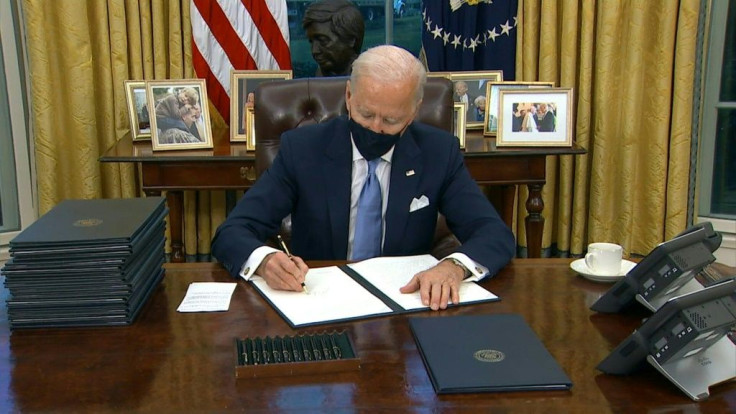Biden Takes the Reins, Calls for a United Front Against Covid and Other Threats

Julie Rovner, Kaiser Health News
Joe Biden on Wednesday took the oath to become the 46th president of the United States, vowing to bring the nation together in the midst of an ongoing pandemic that has claimed more than 400,000 lives, enormous economic dislocation and civil unrest so serious that the U.S. Capitol steps where he took his oath were surrounded not by cheering crowds, but by tens of thousands of armed police and National Guard troops.
In his inaugural address, given outside despite concerns for his physical security, Biden emphasized unity, the driving theme of his campaign. “My whole soul is in this, bringing America together, uniting our nation,” he said. “And I ask every American to join me in this cause.”
On health care, Biden made it clear that combating the covid-19 pandemic will be his top priority. “We must set aside politics and finally face this pandemic as one nation,” he said. “We will get through this together.”
Among Biden’s first official actions Wednesday afternoon were several covid-related executive orders. As promised, Biden is requiring masks and physical distancing in federal buildings and on other federal properties, and by federal workers and contractors. He also announced the U.S. will renew its membership with the World Health Organization, which former President Donald Trump was in the process of leaving. And he will re-establish the pandemic preparedness office in the National Security Council, which the Trump administration had dissolved.
Last week, Biden unveiled a covid plan that also includes using the Defense Production Act to speed the manufacture of syringes and other supplies needed to administer vaccines; creating federal vaccination centers and mobilizing the Federal Emergency Management Agency, the National Guard and others to administer the vaccines, and launching a communications campaign to convince reluctant members of the public that the vaccine is safe. Details on his vaccination plan followed his unveiling the day before of a $1.9 trillion covid emergency relief package.
Biden got a separate boost earlier in the day with the swearing in of two new Democratic senators from Georgia, fresh off their victories in a Jan. 5 runoff election. The additions of Sen. Jon Ossoff and Raphael Warnock, plus a tie-breaking vote from new Vice President Kamala Harris, gives Democrats 51 votes in the Senate and effective control of both chambers of Congress for the first time since 2010.
With such narrow majorities in the House and Senate, it seems unlikely Biden will be able to make good on some of his more sweeping health-related campaign promises, including creating a “public option” to help expand insurance coverage and lowering the Medicare eligibility age from 65 to 60.
But even the barest of control will make it substantially easier for Biden to get his appointees confirmed in the Senate, and the possibility is open to use a fast-track process called budget reconciliation to make health-related budget changes, perhaps including modifications of the Affordable Care Act that might make coverage less expensive for some families.
Beyond covid, health is likely to take a back seat in the early going of the administration as officials deal with more pressing problems like the economy, immigration and climate change.
Biden health aides are expected to begin to unwind many of the changes made by Trump that do not require legislation, such as restoring anti-discrimination protections for transgender people and reversing the Trump administration’s decision to allow some states to implement work requirements for adults covered by Medicaid. But even that could take weeks or months.
Kaiser Health News (KHN) is a national health policy news service. It is an editorially independent program of the Henry J. Kaiser Family Foundation which is not affiliated with Kaiser Permanente.



























